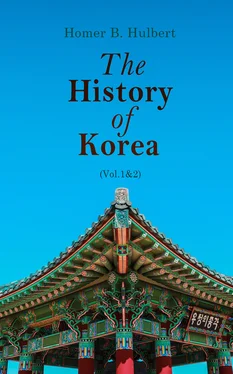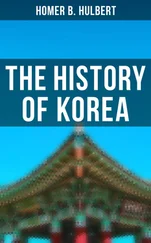Following the directions of Wang-gön in regard to the city of P‘yŭng-yang, he decided to make this town a secondary capital. In the prosecution of this work many people were compelled to give their time and labor, and great suffering was the natural result. Many of the people of Song-do were compelled to move to the northern capital. This was very distasteful to them, and, joined with the king’s blind adherence to Buddhism, made it easy for the people to rejoice when in 970 he died and his younger brother So became king. His posthumous title is Kwang-jong. He in turn married his own sister, and the records intimate that another reason for marrying in the family was that it kept out undesirable connections who would naturally expect to receive positions under the government.
When in 953 the emperor sent an envoy to the court of Koryŭ approving of the coronation of the new king, he was accompanied by a great scholar, Sang Geui, who found such favor in the eyes of the king that he remained and took office under the government. It is said that this caused a serious set-back to the fortunes of Buddhism. Well would it have been could he have seen that insidious power crushed and driven from the country. But it had gained too strong a foothold to be overcome by the teaching or example of a single man or coterie of men. It is not unlikely that it was at the suggestion of this man that the king changed the law concerning slavery. Heretofore slavery had been the punishment for comparatively venial offences and the country was overrun with slaves. The king manumitted manymany of these and by so doing gained the enmity of many who thus lost valuable property. It also resulted in outbreaks among slaves, incipient riots, because this humane tendency in the king emboldened them to claim more than he had intended. It showed that sometimes the indiscriminate franchisement of slaves may be a dangerous thing.
The most radical reform instituted at the advice of this Sang Geui was the establishment of a national competitive examination similar to those held in China. In Korea it is called the kwaga . The examination was a six-fold one; (1) heptameter verse, (2) hexameter verse, (3) commentary, (4) historic citation, (5) medicine, (6) divination.
Communication with China seems to have become more frequent and close, for we find that in 960 an envoy went to China carrying as gifts 50,000 pounds of copper and 4,000 pieces of rock crystal used in making spectacles. This was likewise a period of Chinese immigration, encouraged without doubt by the flattering reception given to Sang Geui. The king gave the visitors a hearty welcome, provided them with houses, gave them office and even secured them wives. So far did he go in the way of providing houses that he incurred the resentment of some of his highest officials, one of whom, So P‘il, asked the king to take his fine residence from him as a gift. In surprise the king asked him why he wanted to give it up. The answer was, “It will be seized anyway when I die and I would rather give it up now and spend the rest of my days preparing a little home somewhere for my children.” This threw the king into a rage; but the shot told, for he stopped the form of injustice from that very day.
The following year, 961, a sweeping change was made in the style and color of official garments. This was also under the direction of Sang Geui. For the highest rank purple was used, and for the second rank red, for the third rank deep red, and for the fourth rank blue.
How far this king had degenerated from the standard set by the founder of the kingdom, less than fifty years before, is apparent from the fact that he was the pliant instrument of anyone who had access to his ear. He believed anybody and everybody. Enemies accused each other before him and he accepted every statement as true. The result was that the prisons were simply bursting with inmates and the executioner’s axe was busy night and day. Hundreds of men were executed whose only crime was that they had been accused before the king. Added to this was a prodigal waste of treasure in the building of palaces, the assumption throughout of Chinese clothes and the entertainment of countless “friends” who came from across the border, on the principle, no doubt, that where the carcass is there will the eagles be gathered together. This state of things continued up to 969, going from bad to worse. That year the king took to himself two Buddhist monks as mentors. He suddenly awoke to the fact that many murders lay at his door and he began to have twinges of conscience. He thought to make it right by a wholesale favoring of Buddhism. He put himself entirely into the hands of the monks and let them manage all the affairs of state to suit themselves. But this, while it may have eased his conscience, brought no betterment to the state. He was imposed upon in the grossest manner and never once guessed it. He lost the respect of all men of sense and reason. His useless reign dragged on till 976 when the country was relieved of the mighty incubus by his death. The prisons were overrun with innocent men, priestcraft had wound its octopus tentacles about every branch of the government. Energy and patriotism had been eradicated; for, the moment a man possessing these traits appeared, jealousy caused him to be accused to the credulous king and he was thrown into prison.
But now his son, Chu, came to the throne. His posthumous title is Kyong-jong. His first act was to open the prison doors and liberate all who were not condemned felons. This act of mere justice was greeted by applause from the people. It was the signal for a general reform in the methods of administration. The monks were sent back to their monasteries. The competitive examinations were renewed and an impetus was given to the study of the classics. The king in person examined the papers of the candidates. But death put an end to his promising career after six short years and in 982 his younger brother, Ch’i, posthumous title Song-jong, ascended the throne. Fortunately he was of the same mind as his deceased brother and the good work went on unchecked. He first did away with the senseless festivals described under the reign of Wang-gön, at which all manner of animals were represented. He changed the names of official grades to correspond with those of the Tang dynasty in China. Intercourse with China was revived and frequent envoys passed back and forth. It was in the second year of his reign, namely 983, that the time-honored custom was instituted of the king plowing a piece of land in person each year. This too was borrowed from China. Confucianism received a great impetus during these days; an envoy to China brought back a picture of the emperor’s shrine, of the patron genius of China, of Confucius’ shrine, and a history of the seventy-two disciples of the great sage. Financial affairs engaged his attention too, for we find that in this year 984 the legal rate of interest on money was set at ten per cent per mensem . The defenses of the country were not neglected. A fortress was begun on the banks of the Yalu River but the people of the Yŭ-jin tribe caused the work to be suspended.
The Kitan tribe were still in the ascendant and so ominous was the growth of their power that the envoy from China who came to perform the ceremony of investiture of the new king, intimated that China would be glad to join the forces of Koryŭ in an invasion of the Kitan territory. We are not told what reply was given but nothing seems to have come of it. Buddhistic encroachments were checked and a stop was put to the seizure of houses for the purpose of erecting monasteries. Mourning customs were changed; the three years’ limit was shortened to one hundred days, the one year limit to thirty days, the nine months’ limit to twenty days, the six months’ limit to fifteen days and the three months’ limit to seven days. Special instructions were given to the governors of the provinces to foster agriculture, and prizes were offered for superior excellence in agricultural methods as proved by their results. The governors were allowed to take their families with them to the provincial capitals. This marks a long step in advance, for it would seem that heretofore the families of provincial governors had been held at the national capital as a guarantee of good behavior on the part of the governors while in the country.
Читать дальше












